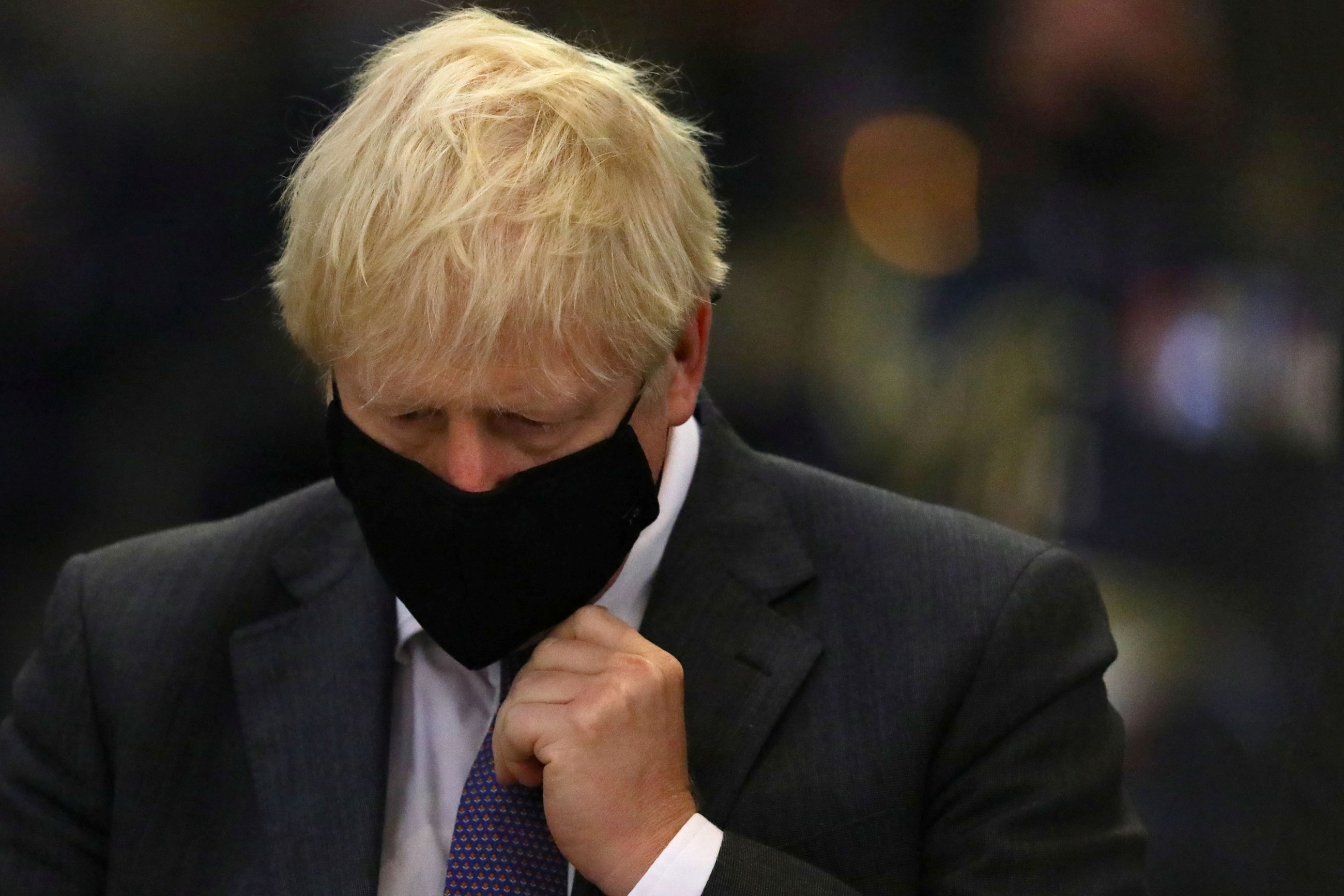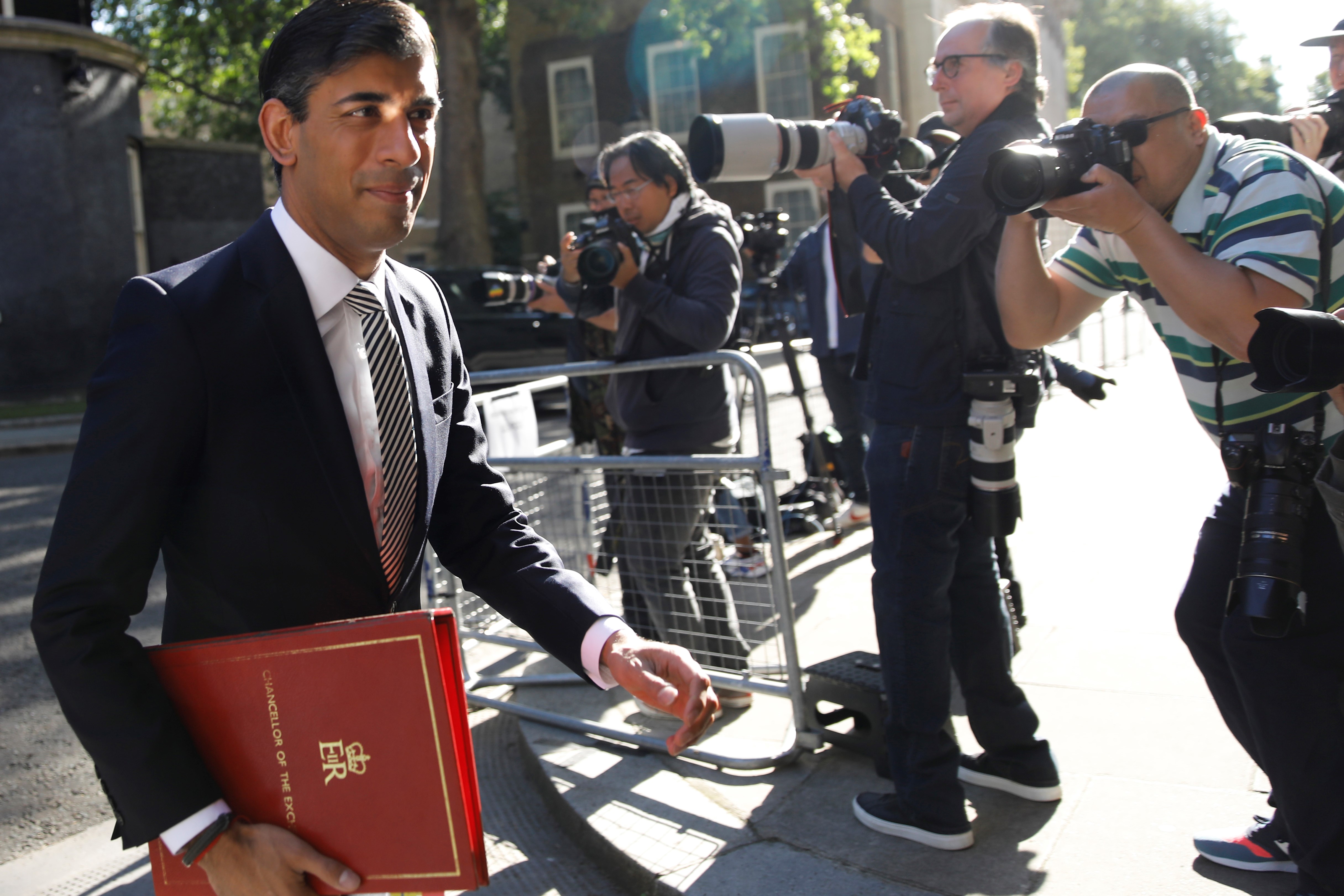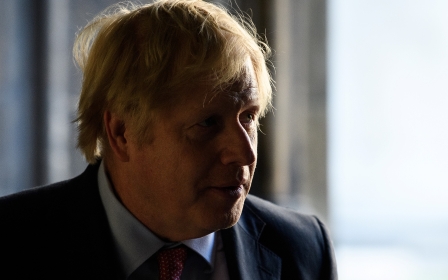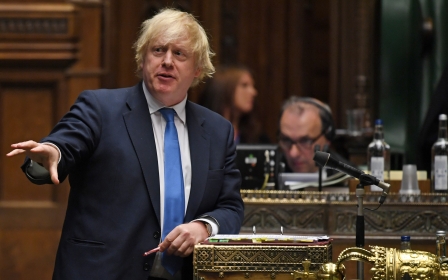Britain is facing a national crisis. Boris Johnson is running out of time

There's a history of fratricide in the British Conservative Party.
Think Margaret Thatcher, who was prime minister (1979–90), or MP Iain Duncan Smith, who served as leader of the Conservative Party (2001–03), or former prime minister Theresa May.
All destroyed by their own team.
British Prime Minister Boris Johnson may be removed faster and even more brutally than his predecessors.
Over the last few weeks he has suffered personal and political disasters. Yet another ministerial resignation, this time by the Scottish law lord Richard Keen, who resigned last week over the Brexit bill row. Yet another permanent secretary of the government legal department, Sir Jonathan Jones, has quit over Brexit deal changes.
New MEE newsletter: Jerusalem Dispatch
Sign up to get the latest insights and analysis on Israel-Palestine, alongside Turkey Unpacked and other MEE newsletters
Meanwhile, Johnson faces a Tory revolt led by Graham Brady, chairman of the 1922 committee, over the handling of the Covid-19 pandemic.
The party also faces renewed scrutiny over huge donations and private meetings that party leaders, including Johnson, held with the wife of a Russian oligarch linked to Vladimir Putin.
And the media barons who swept him into power in the December general election are turning against him.
A hatchet job
Saturday's Times published the most savage hatchet job on a serving prime minister I have ever read. It attacked the prime minister on multiple fronts, exposing Johnson's mental fragility, claiming that he can't remember what he's been briefed by officials from one day to the next.
Saturday's Times article paints a cruel picture of Johnson as a man filled with private despair
It went deeply into his private life, saying he missed the reassuring presence of his former wife Marina Wheeler, who left him over his "repeated infidelities". It looked at Johnson's alleged financial difficulties, suggesting that he is struggling to pay for extensive domestic commitments on his £150,000 ($192.000) a year prime ministerial salary.
The article paints a cruel picture of Johnson as a man filled with private despair.
But the main significance of this piece is its publication by The Times, the flagship newspaper in the Rupert Murdoch empire, which backed Johnson for the premiership last December.
Nine months later Murdoch, Johnson's loyal ally, has become his unforgiving enemy.
The vote leave machine
There are signs that the Associated Newspapers, owners of the powerful Daily Mail, are also turning against him. Only the Barclay Brothers, owners of the Telegraph, remain supportive. The skids are under Johnson.
Tackling Johnson and keeping Cummings will change nothing. And getting rid of Cummings is more easily said than done
But will changing the prime minister make any real difference? I think not.
As I've written before in these columns, hapless Johnson is manipulated and dictated to by a closely knit group of Vote Leave enforcers, of whom the two most powerful are his cabinet colleague Michael Gove and his "senior adviser" Dominic Cummings.
This means that the chaos will not end until Gove, Cummings and their associates have gone. A telling anecdote in that destructive Times article showed the inviolate power wielded by the Gove/Cummings Vote Leave machine.
The anecdote concerns Northern Ireland Secretary Brandon Lewis' calamitous announcement to parliament that Britain intended to break international law. According to the Times, the Northern Ireland secretary was given "the words to say" by a former Vote Leave staffer, Oliver Lewis.
It's not clear whether Johnson even knew what was going on.
As Tacitus wrote of the Emperor Galba: "Omnium consensu capax imperii, nisi imperasset". Translation: "Considered capable of ruling until was put in charge."
So let's spell out exactly who needs to go if Britain is to get back on her feet: Lee Cain, Johnson's director of communications; Cummings, his senior adviser, who breached lockdown rules but was backed by the prime minister. Also, Cummings' proteges such as Oliver Lewis; Suella Braverman, the attorney general, who doesn't understand the need to protect the law; incompetent careerist Health Secretary Matt Hancock, who has made such a mess of handling the Covid-19 pandemic; and lastly, the over-promoted Home Secretary Priti Patel.
I could add others to this list.
A new prime minister?
Britain certainly needs a new prime minister who will restore grown-up government and respect for the rule of law. But tackling Johnson and keeping Cummings will change nothing. And getting rid of Cummings is more easily said than done.
If Johnson goes, any leadership contest would likely be won by the most right-wing candidate
Bear in mind that if Johnson goes, his successor will be chosen by the approximately 190,000 Conservative Party members. Chillingly, that means this tiny group – well under 1 percent of the electorate - currently controls the destiny of Britain.
According to a poll by YouGov, many hold bigoted views. For example, more than half of those polled said that Islam was a threat to British life.
If Johnson goes, any leadership contest would likely be won by the most right-wing candidate. That could mean immigrant-bashing Patel, already grossly over-promoted as home secretary.
There's no reason to suppose she would be any more competent than Johnson. Gove - Rupert Murdoch's favourite member of the cabinet - is another troubling possibility. By conventional measurement the two most impressive candidates are Chancellor Rishi Sunak and former health secretary Jeremy Hunt.
Hunt came second in the Tory leadership contest won comfortably by Johnson last year.
He's made a lot of sensible comments during the Covid-19 emergency and was one of the voices urging the government to take action quicker when the outbreak first gained momentum in March. A voice of sanity compared to the panic and confusion emerging from Downing Street, his presence in Downing Street would calm things down and go some way to restoring Britain's broken international reputation.
But would the Tory membership vote for him? Doubtful.
Chancellor Rishi Sunak has his fans. He is judged to have managed Treasury finances during the pandemic well, but harder decisions are on the horizon. He's inexperienced. He was an analyst at Goldman Sachs, one of the world's most successful investment banks, before working for various hedge fund firms. But that tells us nothing about whether he has the talent for leading government.
Sunak could emerge as Britain's answer to France's President Macron. The technocratic candidate of Davos and Goldman Sachs. He has the merit of being an homme serieux, but at 40 he is still young and unproven.
Three scenarios
To sum up. The Vote Leave team which has established itself in Downing Street like an incubus won't want Johnson to go. They still see him as their pliable puppet and as their best change of staying in power.
But Johnson's prospects are nevertheless poor. Winter looms with a fresh wave of Covid-19, renewed economic calamity, Brexit madness and the threat of national disintegration. There is no sign at all that Johnson is capable of dealing with any of these dire problems.
Let alone all of them at once.
That's why I see three scenarios: a coup d'etat within the government which dislodges Johnson but leaves the Vote Leave team in charge.
A coup d'etat which gets rid of the Vote Leave incubus as well as Johnson, leaving Sunak or Hunt to pick up the pieces in the wake of the Johnson debacle. That's the best hope for the Conservatives. But it's a long shot.
Third, if the current leadership muddles on for much longer we may be facing a national crisis of such magnitude that it leads to the creation of a coalition government with the Labour leader Keir Starmer installed as prime minister.
Such is the scale of the current mismanagement, that may well become the best option at this dreadful time.
The views expressed in this article belong to the author and do not necessarily reflect the editorial policy of Middle East Eye.
Middle East Eye delivers independent and unrivalled coverage and analysis of the Middle East, North Africa and beyond. To learn more about republishing this content and the associated fees, please fill out this form. More about MEE can be found here.







